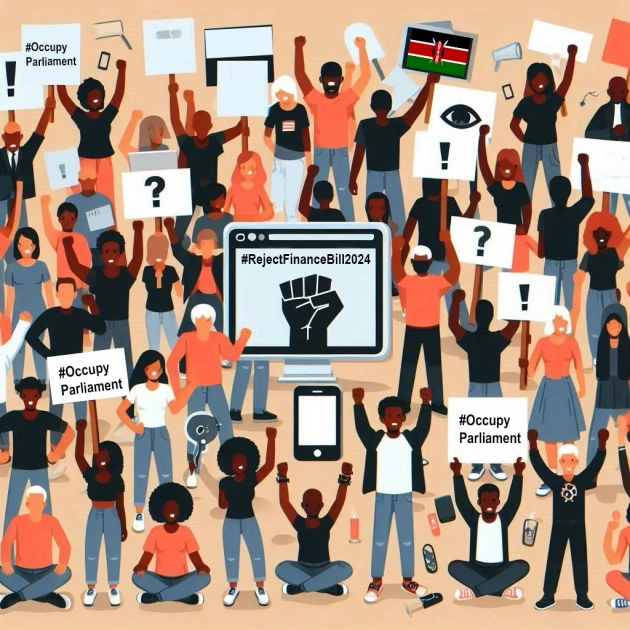Keyboard warriors are the new ‘ground’: Why #HashtagActivism can no longer be ignored


Audio By Vocalize
Ever since Peter Kenneth was assured of winning the presidency because he was a big deal on Facebook, the term keyboard warriors is largely a slur to show that once influence ends when they log off.
To be honest, that did carry some weight before because a majority of the content that was pushed online was largely sponsored and the few vocal people were known political activists.
Just four days ago, Dr David Ndii, who chairs President William Ruto's Council of Economic Advisers dismissed the online protests for the Finance Bill 2024 tweeting; “Politics is a contact sport. Digital activism is just wanking.”
But unbeknownst to Ndii and his ilk, this was a different kind of protest. The anger expressed online was manifesting offline.
The so-called “middle-class Kenyans” who are contemptuously said to twiddle their thumbs online ranting about things that the “common mwananchi” at home does not relate to, were now speaking the same language.
It is not unusual to hear that the "Twitterrati" are as far apart from the “ground” (common man) as heaven and earth.
What was different about hashtag activism this time around was the lack of a leader. Boniface Mwangi and other activists were not the ones pushing the #RejectFinanceBill2024.
It reminds me of the Arab Spring which was not launched by some popular activist but blew up literally and figuratively after a Tunisian fruit and vegetable vendor set himself on fire in the town of Sidi Bouzid
This time round you had your regular noisemaker on Twitter who was ranting and asking people if they really understood what was about to happen to them once the Finance Bill passed.
The small creators on TikTok were now making videos teaching their followers on what is contained in the Bill.
Those videos would then find their way to other platforms like WhatsApp, Facebook, Instagram where they would be shared heavily.
But the turning point would happen when those videos landed on Twitter and would trend for days.
In turn, the media, both vernacular and national would cover the online protests and amplify the voices and issues.
There was a running joke that the opposition to the Finance Bill had turned "Twitter and Instagram baddies" into political activists.
A "baddie" is a girl who is very pretty and loves the finer things in life and they dedicate their lives to showing how well they are living. They are girls who everyone would love to know, date or just hang out with.
The world would be burning but a "baddie" would be on IG posting their photos pouting, flashing the peace sign with vanity captions like "Confidence is my most valuable accessory. #Blessed #ThatGirl", "I just took a DNA test, turns out I'm 100% that b$#ch...", "Self-love is the best kind of love, take me back..." They are very removed from the day to day life.
Now you had the "baddies" pause their usual selfies and vanity content to demand the total rejection of the Finance Bill. If you are a netizen then you know how big of a deal this was.
If you were keen enough, you would see people say they had never heard of the Finance Bill and its impact on their lives. This was the difference in this #HashtagActivism.
Major content creators were also forced into the Finance Bill because Kenyans demanded they take a break from their usual Rigmarole and what the audience wants, the audience gets.
Now you had the popular content creators turn influencers for the anti-Finance Bill and the drip, drip had turned into a whole downpour.
Then the stroke of genius happened. Someone asked Kenyans to text their Parliamentarians and ask them to reject the Finance Bill. People started sharing numbers of all politicians starting with President William Ruto, nobody was safe, the anger was here and it would not be ignored.
This is what changed the entire conversation because it showed the anger and the commitment Kenyans had in opposing the Bill.
Now you had Members of Parliament being forced to say where they stand on the issue. There are some few dimwits who said they will vote with the party while there are others who said they will listen to the voice of the people.
The “SMS your MP” trick was a major success but the online guys were not done, another brought up the issue of now moving the protests online to the actual streets.
Here, many thought it would be dicey, the rubber was about to meet the road and some thought the keyboard warriors would log off and that would be the end of it.
But come Tuesday, June 18, 2024, on the day that the Bill was to be tabled in Parliament and the protest that started online was now alive and kicking.
The moment was here, the people who were texting their MPs were staring down the police in the streets and taking in teargas. The ground was here, it was loud and angry.
But while this was happening, the President and his entire Party were announcing they had dropped the contentious tax clauses from the Finance Bill 2024.
They tried to say it showed they listened to the people but to be honest, they did not have a choice, they yielded to the demands of the people and more still needs to be done.
Online activism is the new ground, ignore it at your own peril.


Leave a Comment